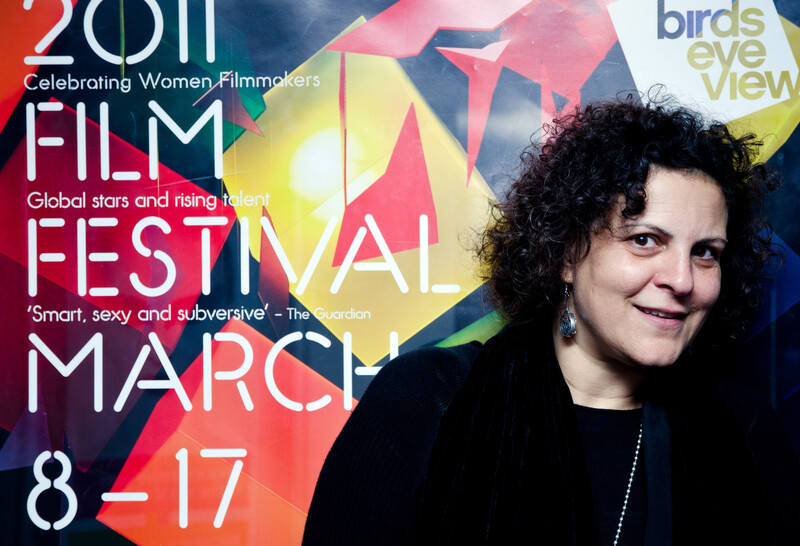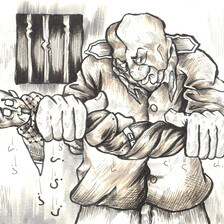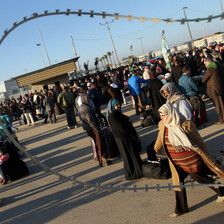The Electronic Intifada 9 October 2014
“They want to view me as a ‘good Israeli Arab director’ or a ‘nice Israeli Arab,’” says filmmaker Suha Arraf, who recently came under attack by the Israeli government and its supporters for labeling her latest work a Palestinian production.
“The moment you say Palestinian, though, you become the enemy,” she told The Electronic Intifada.
The 45-year-old filmmaker from the town of Maaliya in the Galilee region of present-day Israel has screenwriting credit for the critically acclaimed feature-length films Lemon Tree (2008) and The Syrian Bride (2004), and directed the documentary Women of Hamas (2008).
Her new feature film, Villa Touma, set in the occupied West Bank city of Ramallah, depicts an aristocratic Christian demographic in Palestinian society. In the film, three unmarried women, largely secluded from society, seek personal redemption by marrying their orphaned niece to an “acceptable” Christian suitor.
Villa Touma has recently screened at international film festivals across Europe and North America. In general, it has been warmly received. Yet, during the Venice Film Festival in July, Arraf’s latest work elicited attacks from Israelis after the filmmaker listed it as having been produced in Palestine.
Along with other government institutions, Israel’s culture ministry subsequently announced that it may demand Arraf return up to $580,000 in public funds she had accepted for the film’s production.
“No legal basis”
Naftali Bennett, Israel’s economy minister and a member of the extremist pro-settler party Habeyit Hayehudit (Jewish Home), also attacked Arraf. Labeling the work “as a Palestinian film is unacceptable and unfair,” Bennett, who is known for his anti-Palestinian views, told the Israeli daily The Jerusalem Post.
Salah Mohsen, a spokesperson for the Haifa-based Adalah Legal Center, which promotes the rights of Palestinians in Israel, argued that Arraf’s attackers use double standards for Palestinians.
“It is very common for Israeli films to receive European funding, but no one demands that they be classified as European films,” he told The Electronic Intifada. “Films belong to the producers, not the funders. There is absolutely no legal basis for asking her to return the money because Suha followed the stipulations of the contract exactly.”
Arraf was contractually obligated to place official logos of the public institutions that provided funding on the film fliers.
In the end, Arraf decided to remove the Palestine classification from the film. Yet, rather than give in to the demands that it be labeled an Israeli production, she changed its classification to “stateless” upon arriving to the Toronto International Film Festival last month.
“It is my refugee film,” she told The Electronic Intifada. “Like Palestinians everywhere, it is stateless.”
The following interview was conducted shortly after Arraf returned from a film festival in Iceland.

Suha Arraf (Birds Eye View Film Festival/Flickr)
Patrick O. Strickland: In many ways, Villa Touma is quite different than your previous films. In both The Syrian Bride and Lemon Tree, as well as in some of your documentary work, you explore gendered spaces in Palestinian and Arab society under Israeli occupation and colonization. In Villa Touma, you seem to also delve into class issues as well. What motivated you to tackle class issues?
Suha Arraf: That’s right. While Villa Touma is a very political film, the political is not in your face like in Lemon Tree. The occupation is not frontal. It’s the influence of the occupation of ’67 for people, especially for this bourgeois and aristocratic class in Ramallah and the West Bank. Nobody deals with this issue. Ramallah used to be a very classic and aristocratic town before the occupation began in 1967.
The film is about the political, yes, I see it as a very political film. But in every movie you are dealing with humans. I think that we as Palestinians like to present ourselves as either heroes or victims to the world — but we’re never humans. In Palestinian, Israeli and international cinema, too, it’s either heroes or victims. There’s nothing in between. There’s nothing in the middle. We lost the humanity. But between hero and victim there is the human being.
I tried to deal with family issues, the dynamics inside the Palestinian family. At the same time, the political aspect is there. It’s always there. When people are living under occupation, you cannot deny it. What I tried to do is to work on the dynamic between the three sisters and the young lady that comes to live with them. This is the most important thing. You find that these three sisters are affected by the occupation, by living in the past. They totally froze time. The film is set sometime around the beginning of the second intifada, but the interior of the house … the way they dress … it is all the same as before the 1967 War.
So I asked myself: what would Ramallah look like today if there were no Israeli occupation? Would it look like it used to, or would it look it does today? And I have no idea, I have no answer. Honestly I don’t know. But the family that I deal with in Villa Touma stayed the same. They kept the bourgeoisie behavior. They don’t have money anymore, but they preserved the way the elite talked, how they dressed, how they ate, and so on.
PS: Can you explain a bit more the effect of setting the film in 2001 but giving the initial impression that it takes place sometime in or around the 1960s?
SA: I built the film in three acts, in a traditional structure. I built the first act as a period piece. You don’t really know when the film takes place as a viewer. You start feeling that it could be late fifties, the sixties, maybe even the seventies. But the first time the characters leave the home — after the first act — you understand that it’s much closer to the present day.
This is shocking for the viewer. I wanted to keep the timing confusing, and it’s a very claustrophobic film. Most of the film happens inside the villa. Maybe there are a total of six or seven scenes outside the villa. During 1967, many Palestinians fled or were forced to leave. My characters were forced to escape inwardly. They escape inside the villa; they take refuge in their home. They build a wall around themselves.
I built a wall around the villa, symbolic for the wall around the occupied West Bank. Inside the home, there are the colors of the Palestinian flag. I use the house as being isolated alone, like the West Bank is caged and isolated due to the Israeli closures.
“Living in denial”
PS: For you as a filmmaker, what was the most important social critique you wanted to communicate in Villa Touma?
SA: Well, I am not dealing with a single idea, of course. But if you ask me about the focal point of my film, it’s about denial. People are living in denial. The reality of the 1967 occupation was very difficult for people to handle, so they deny it.
And this is what I wrote about it with the family in the film. They deny everything. For them, nothing exists but them. Nothing happened outside, not the changes, the intifada, nothing. And even other Palestinians don’t exist, they treat them as rubbish.
The bourgeoisie of course wasn’t only in Ramallah and wasn’t only Christian families. And I met [Palestinians] like this in the United States. Living in the past, keeping black-and-white photos and dreaming of the beautiful Palestine. It’s also denial.
PS: How do you see the state of Palestinian cinema today?
SA: We are doing very badly, in my opinion. Our stories are great, of course. There have been very powerful films [in recent years]. We only have a few directors, and we are struggling to fund our art. It’s not easy. There is no funding for films in Palestine. There are not enough crews. We cannot make a film with a solely Palestinian crew because we don’t have the facilities or the equipment. Nonetheless, we have amazing stories. We have a lot of pain. And as directors, we are great storytellers.
Repressing identity
PS: Before the film premiered at the Venice Film Festival, Israeli politicians were outraged by your classification of it as Palestinian. Culture and Sports Minister Limor Livnat demanded that you return funding and the likes of rightwing anti-Palestinian figures such as Naftali Bennett echoed this demand. Can you briefly explain how the controversy started?
SA: It started a month and a half before I traveled to Venice, and I traveled to Venice still under these attacks. It started with the minister of culture, who never spoke to me personally. Until now, no one ever came to me personally to talk. They were in the media before even checking the contract. They used me as a political lever. My story happened during their war on Gaza and during the internal elections for Likud [the Israeli political party of Prime Minister Benjamin Netanyahu].
They used me and the film. They said they were going to investigate me, but no one ever came and investigated. I read about it in the newspaper, actually. I had no idea about it until I found about it while searching on Google. Journalists had come to me and asked for my reaction. At first I said, “My reaction to what?”
The Israeli Film Fund actually supported me a lot, and until the end. It was big surprise to me that they defied the ministry of culture and the Council of Cinema.
PS: Do you see this as part of a broader pattern of Israeli attempts to repress national identity — including cultural and artistic output — among Palestinians in present-day Israel?
SA: Listen, it is known that Israel is a very racist country. It’s easier for them to understand us [Palestinian citizens of Israel] as “Israeli Arabs.” There is no such thing, of course. It’s better for them because as “Israeli Arabs” we are a minority. But we are part of the Palestinian people. When we say we are Palestinian, we are part of the majority. It scares them. They want to view me as a “good Israeli Arab director” or a “nice Israeli Arab.” The moment you say “Palestinian,” though, you become the enemy.
This is the mind of the occupation. It wants to occupy everything, from the hummus and falafel to my film. If my film didn’t go to Venice or Toronto, who would’ve cared if I called it a Palestinian film? Really who would have cared? Because it was successful, they want it to be theirs. The film belongs to the artist, not the funders. I’m a Palestinian, but they want my film to be Israeli.
I actually got a lot of support from Israeli directors. One hundred and four directors signed a letter supporting me. They knew something very nasty was happening. The government treats most directors very badly. They don’t want any films about Palestinians, or films that show a perspective that is considered left-wing. They want just Zionist films.
PS: Do you have any ideas about what you plan to work on next?
SA: I am now writing a film called Jafaf. It’s about sexuality, and I want to shoot it in Jordan with Syrian actors. It will take a lot of time. I just started writing, and it will be a long process.
Patrick O. Strickland is an independent journalist and frequent contributor to The Electronic Intifada. His reportage can be found at www.postrickland.com. Follow him on Twitter: @P_Strickland_.





